5 things that are really giving Msian cyber cafes a bad reputation
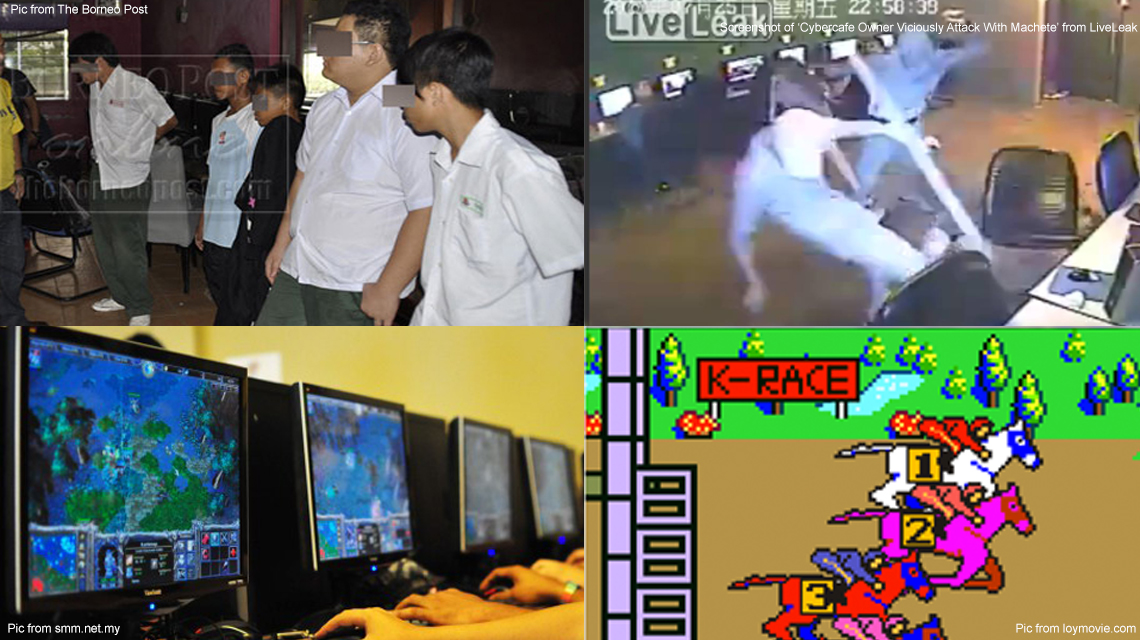
- 423Shares
- Facebook416
- Twitter1
- LinkedIn1
- Email2
- WhatsApp3
So among last week’s news of Kuantan’s bauxite pollution and MAS’s luggage problems, you may have missed a fight at the cyber cafe over a game.
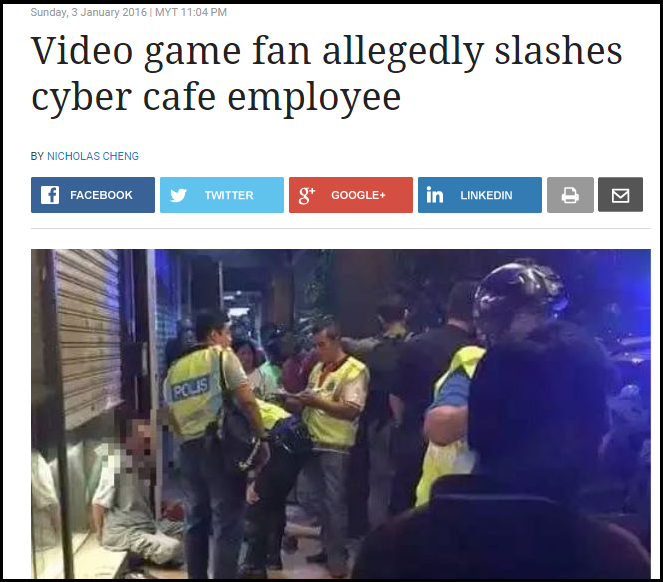
According to the news article, the suspect was arguing with the victim, a worker for the cyber cafe, because the worker was reportedly hogging a computer that he wanted to use. After the argument, he came back with a parang and slashed the worker, and the worker’s friends then slashed the attacker with the fella’s own parang.
A few days later, The Star ran the following frontpage on their newspaper…
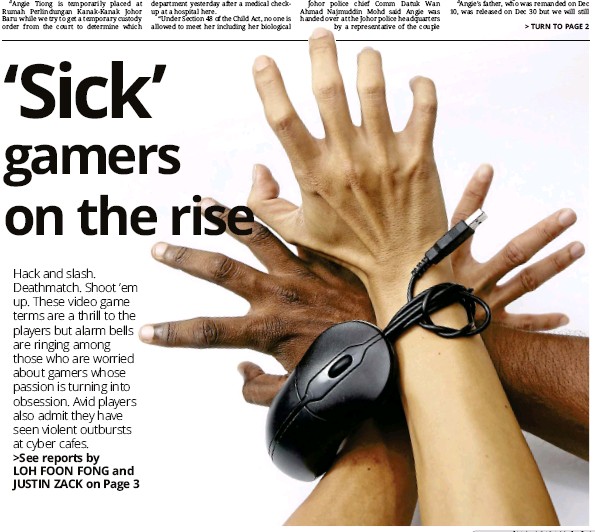
…along with these articles.

Seeing all these headlines will probably make you feel either paranoid if you’re a parent of kids who frequent cyber cafes and plays video games a lot, or angry that the matter has been blown out of proportion.
While the debate on the pros and cons of gaming seem never ending, cyber cafes have been given quite some flak, especially in Malaysia where it seems as tho there’s one at every other shoplot. But are cyber cafes really that bad for Malaysia?
We here at CILISOS decided to kepoh a bit and investigate what has been giving cyber cafes the bad reputation.
1. Cyber cafes get robbed a lot weih?!
So yeah, we’re sure ugaiz have all heard stories about the bad things that your parents warn you about going on in cyber cafes. We took a look at it, and we’re gonna have to say that it doesn’t look too good.
Robberies and attacks towards cyber cafes seem to be a common thing that cyber cafes face. And it’s not something that has only started in recent times, as the following headlines show.
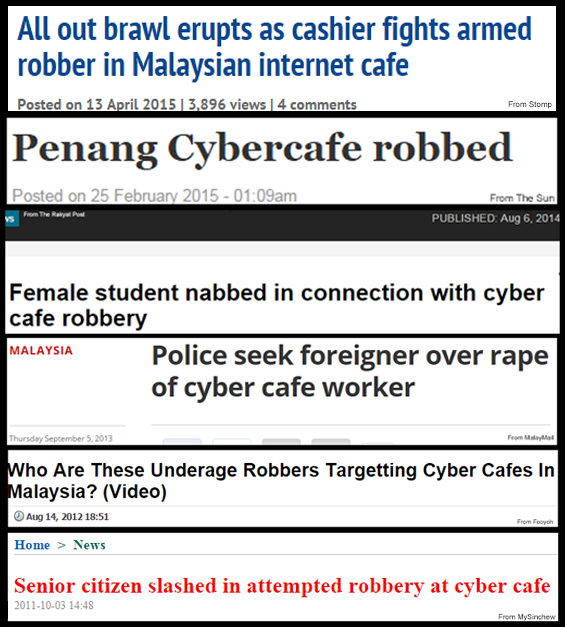
The more careful readers may have noticed that these headlines spread out over 5 years, showing to a certain extent just how long this issue has been for cyber cafes.
Sometimes it’s not just cyber cafes that get robbed. Even customers leaving cyber cafes are prone to being targets, as was the case just months back, as a snatch thief tried to rob a man who had just left a cyber cafe early in the morning.
There are many more attacks on cyber cafes that are caught on CCTV yet don’t get reported in the mainstream media. One of the more recent CCTV footage of a cyber cafe being robbed that got shared quite a bit on Facebook was posted by the Malaysian Crime Awareness Campaign. Ugaiz can view the video below.
A quick search on YouTube shows the numerous CCTV footages of attacks and heists on cyber cafes by baddies. So common that we even found a Youtube account called ‘rob king‘ (what a name). The channel hasn’t uploaded in a few years, however the videos that it has uploaded mostly consist of robberies and attacks on cyber cafes.
COUNTERPOINT: However, it would be extremely unfair to say that such violent crime only occurs purely because of cyber cafes popping up everywhere. A quick look at security reports on Malaysia in 2015 show that Malaysia’s crime rating is still considered high. Another article says that although overall crime has gone down, violent crime such as robberies have been increasing faster as compared to other crimes like property theft, while also mentioning that up to 25% of crime doesn’t even get reported to the police.
2. But at least cyber cafes aren’t doing the stealing…. right….
Well technically…. some may have sorta.
Piracy (no, not that Facebook game that has everyone sending out annoying requests) is to reproduce content or work by another without permission. Ugaiz should know laa, the DVD sellers at pasar malam that sell 3 for RM10.
Software piracy however is a big deal in Malaysia. Just a few years back in 2012, the piracy rate in Malaysia was at 55%. This meant that over half of Malaysia’s computers had illegally installed software and programs in it. It got so bad that the International Intellectual Property Alliance, or IIPA (an international body that looks at copyright infringement) actually placed Malaysia on the watchlist because of such bad piracy rates in 2012, although it has since removed Malaysia from it in 2014.
Cyber cafes have in cases contributed to the bad piracy rates in Malaysia, with one notable case of that of a man from Kajang who made illegal copies of software for cyber cafes to buy and use. He even made RM1 MILLION off these pirated softwares.

COUNTERPOINT: Cyber cafes may actually have started using real software in recent times, as some of the most popular games available nowadays such as DOTA 2 go through platforms like Steam. Steam, a platform for games and social interaction, has a strong anti-piracy system in place, meaning cyber cafes may have had to use legitimate software. In fact, with services like Steam, getting real software and getting the games through Steam has been a lot more convenient.
3. Customers also making money illegally btw…
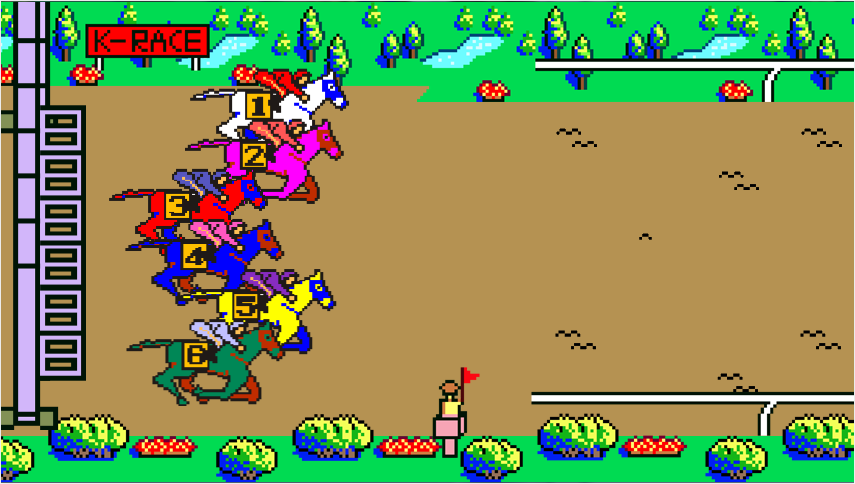
Well, not ugaiz, sure ugaiz go legal cyber cafes…. right… right………
In case you’re wondering, we’re talking about gambling right now, online gambling to be exact. Online gambling in cyber cafes have caused quite a lot of problems actually.
Online gambling has gotten to the point where in recent years, authorities have had to step up regulation and control in order to combat it, especially cyber cafes which allow it (BTW, our Editor has also seen the horse racing game in the cyber cafes he’s been). Former Selayang councilor Yew Jia Haur recently spoke about cyber cafes having to turn to being illegal gambling dens.
“We found that due to economic times, legally registered cyber cafes turned to illegal gambling, so we used to conduct checks often,” – Yew Jia Haur, as quoted in The Malaysian Insider
Home Minister Datuk Seri Dr Ahmad Zahid Hamidi launched a series of operations called ‘Ops Dadu Khas‘ (‘Special Dice Operations’… Datuk Zahid’s pun game is strong) and formed a special team to handle online gambling in December 2014. A year before that, Selangor armed its local council with tasers for when it did raiding operations on cyber cafes to curb illegal online gambling. This is because the raiding teams have faced violent attacks when they conduct their raids.
The Malaysian Communication and Multimedia Commission (MCMC) has also been doing their part in helping curb online gambling. It has shut down over 300 gambling websites in the first six months of last year, on top of 325 websites taken down in the year before.
“The ministry and the MCMC will not keep quiet, but will act by censoring and blocking online gambling or any other inappropriate websites to combat the online gambling activity which had raised public concern,” – Deputy Communication and Multimedia Minister Datuk Jailani Johari, as quoted in The Malaysian Insider
It’s not just the big urban centers in the Peninsula that have gambling in cyber cafes. Penampang has seen a rise in the number of cyber cafes, with some calling the suburb Sabah’s gambling capital. Despite the issue first appearing in the media in 2013, as of last month, the police chief of Sabah mentioned that Penampang, as well as several other towns were still having the problem of online gambling. Lawas of Sawarak also has it’s own documented issues with online gambling.
COUNTERPOINT: But to be fair to cyber cafes, most of the time the gambling dens are actually illegal cyber cafes set up to look legitimate. Just last year during an operation to close down unlicensed businesses, KL City Hall also shut down illegally operated cyber cafes.
We also got in touch with YB Darell Leiking, the MP of Penampang, one of the towns mentioned earlier that had a gambling problem involving cyber cafes. We asked him about the current situation regarding cyber cafes and online gambling, and this was his reply:
“I am aware that for now, the cyber cafes have closed operations since last year and this was done enbloc. Police have also confirmed this to me. However, online gambling via smartphones and tablets are being spread around thru some syndicates but I have yet to get enough information on this new crime,” – YB Darell Leiking, MP of Penampang
4. Huh, you kids ponteng class for DOTA 2 again ah?!
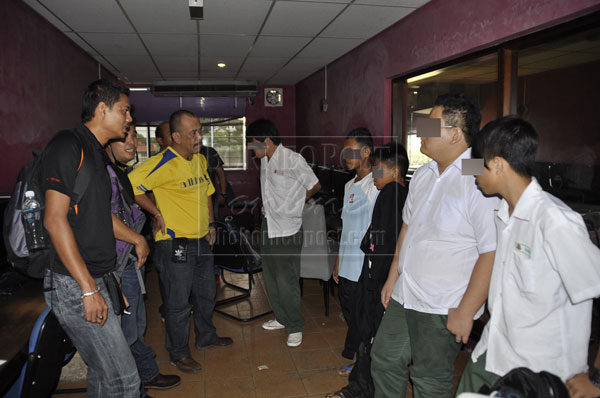
Schoolkids who ponteng sekolah and go to cyber cafes remain an issue in Malaysia that has been going on for almost a decade now. Every now and then you’d see newspapers publishing articles on how groups of schoolkids would cut classes to go play video games at cyber cafes.
The issue reached its worse state in 2008, when the gomen began cracking down on cyber cafes and were even drafting bills to regulate cyber cafes. The main reason behind all this was the rise in schoolkids cutting classes for cyber cafes, which according to this article, 92% of schoolkids played truant to go play games back in 2008. Now while that may seem a ‘lil extreme, for transparency we’d again like to clarify that they got that number from a survey that they conducted. The survey only had 230 respondents, who were of 11-18 year olds, so it DOES NOT fully represent schoolkids at large.
Going back to what we’ve covered earlier, students have also been found gambling online in cyber cafes, as it’s the easiest way to gamble. These online gambling sites and cyber cafes don’t ask for a licence or set an age limit. In fact, if you have the money you can start betting already through the computers at cyber cafes. A survey done in 2014 by Gamblers Rehab Center Malaysia even found that out of the 5000 students they spoke to, 89% had already been exposed to gambling, with 64% of them before even entering Form 1.
COUNTERPOINT: Despite the bad reputation cyber cafes have for being student hotspots, the more legitimate cyber cafes that we’ve seen have turned down students who go in wearing uniforms. Most licensed cyber cafes put up signs too that say no entry for schoolkids. In fact, perhaps we should look at making schools more interesting for students. This study conducted by the Malaysian Crime Prevention Foundation found that most schoolkids actually do wanna go to school, but don’t because of bad experiences at school.
“It’s very sad. There is a mismatch between what they perceive school should be and what they experience. School is not heaven but hell to them,” Dr Zahari Ishak, researcher, as quoted in The Star
5. Someone died in a cyber cafe before?!
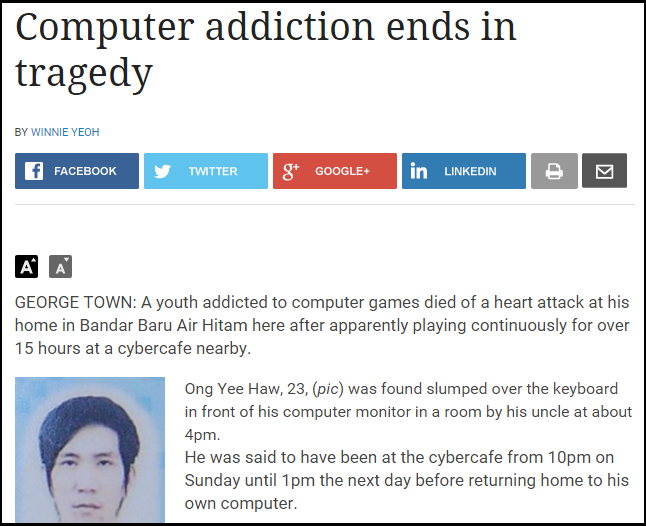
BTW, those who answered the first three means ugaiz didn’t read the article laa. #cilisostipu #cilisossorry
In the one notable case of someone dying related to cyber cafes that was reported in mainstream news, the deceased didn’t even die in a cyber cafe. He did however did spend a good number of hours in a cyber cafe.
But of course, we do realise it’s also about gaming addiction. The Star’s recent article mentioned how parents of kids who are addicted to playing games have started seeking professional help, and that a number of kids themselves didn’t realise just how serious of an issue gaming addiction could be.
“It is potentially a growing problem and there is a need to create more awareness on this. Otherwise, it can become an illness when these gamers come in late for treatment,” – Assoc Prof Dr Muhammad Muhsin Ahmad Zahari, as quoted in The Star
COUNTERPOINT: Despite this the jury remains out when it comes to the pros and cons debate on video gaming. In fact, video gaming addiction isn’t considered a mental disorder by the American Medical Association. There’s also a need to mention that with video gaming is portrayed just as bad as other forms of addiction, while gaming has had its deaths, it cannot be compared to the more serious addictions like alcohol addiction and abuse which causes 2.5 million deaths a year worldwide. At RM2-3 per hour, it’s also a lot cheaper than a bar. That doesn’t mean you shouldn’t take gaming addiction seriously tho, as with all good things, it should be done in a healthy manner.
BUT WAIT! Did the media report the cyber cafe slashing incident correctly?
Based on The Star’s articles and frontpage, you may think that this gaming and cyber cafe culture that Malaysians have, especially among the younger ones, would lead to a downward spiral.
However….
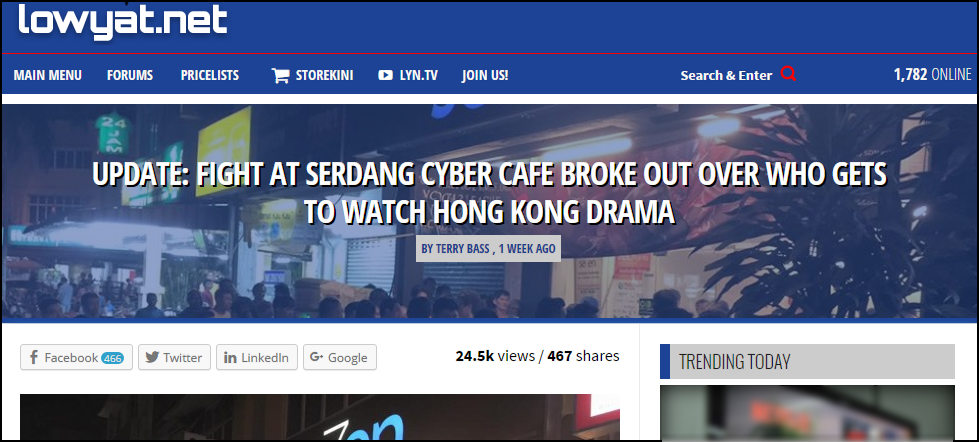
That’s right. That incident at the cyber cafe (which may have led The Star into the ‘Sick gamers’ frontpage) might not have even been about gaming! According to SambalDaily, the police updates mentioned that the fight began cos the guy wanted to watch his Hong Kong dramas, while a worker of the cyber cafe was hogging the pc he wanted. Oriental Daily meanwhile reported witnesses saying that the incident began over both men wanting to watch Hong Kong dramas as well. The victim, according to The Star, has since been warded in Serdang Hospital.
So does it seem as though some media outlets are attempting to sensationalise the incident? There is an actual theory for stuff like this, called moral panic theory. Moral panic theory is when people’s worries over an issue is reproduced by the media in an exaggerated way, and video games and its negatives are a common topic covered by media outlets.
So are cyber cafes really that bad?
So perhaps we can be fair to cyber cafes for a moment? Is it really that different than going out to a mamak with a bunch of friends, except this time there’s a computer instead of a tosai? And about video gaming addictions, many researchers have argued that violent games don’t make people violent, despite some who do. In fact, while talking to people who frequently played games at cyber cafes with friends, they agreed that playing games together boosted their social relationships, which has also been proven through scientific studies.
“At cyber cafes it’s easier to build a bond through talking while playing, especially with people who aren’t good communicating through Skype or chat,” – MrPaggy, cyber cafe regular
While it’s fair to say that cyber cafe culture isn’t the best or healthiest, Malaysians have taken to it like a duck to water. It’s definitely become a form of Malaysian life, and especially among the younger ones represent something integral to their culture. We spoke to a few who visited cyber cafes often on why they do, and most of their replies can be summed up in the following.
“You can play online in our own houses, but you cannot beat seeing the looks of your friends as you play games together in a cyber cafe,” – Avance, cyber cafe regular
- 423Shares
- Facebook416
- Twitter1
- LinkedIn1
- Email2
- WhatsApp3





